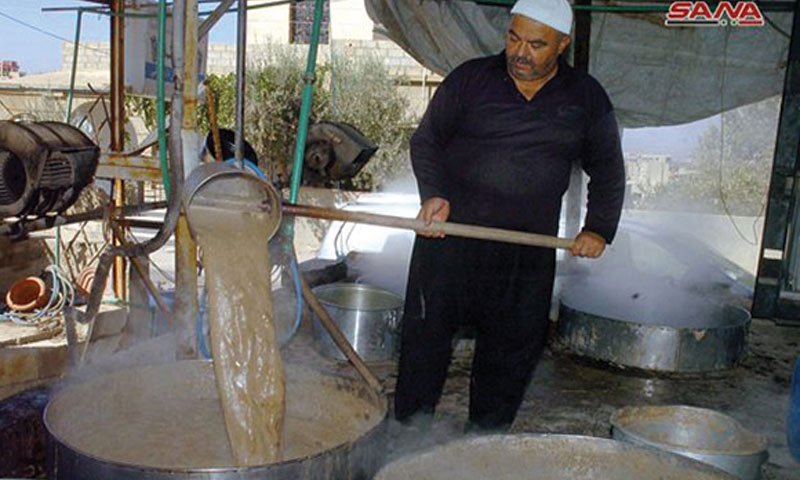At the end of the grape harvest season in Sweida, Southern Syria, another annual season begins with which people prepare the annual winter supplies, including the grape molasses.
This winter-related custom developed into an industry, upon which many farmers depend as its usually made at home, other producers use mechanical squeezers, which started spreading lately.
The governorate of Sweida is considered the first producer of grape molasses, famous in Syria for its quality and test, which triggered many people to produce and turn it into a source of living.
Small Factories and Individual Efforts
Saad, a young man from the city of Sweida, who graduated two years ago from the Agricultural Engineering Faculty, works in his father’s fields in the village of Qanawat, tells Enab Baladi that he started working in the field since graduation, according to cultivation seasons of apples, grapes or cherries, the products of which are sold to the foodstuff factories.
Saad added that, in time, he discovered that he could make molasses from grape instead of selling it to the factories, to start another phase of his practical life with the help of his mother, who inherited the skill of molasses making from her mother, and her grandmother, just like all the governorate’s women of the fifties, as he put it.
Saad made a leap, as he reached another stage in expanding his home-based industry and exporting it to the coastal governorates, western Syria, to later decided getting a license for a small factory and give his products a famous name, to distinguish them from the rest of the products.
The young man’s ambitions faced dozens of difficulties, as he failed to get a license. However, his home-based factory is still producing, and his products are yet exported to the rest of the Syrian governorates every year.
Grapes in Sweida
The process of making the molasses begins with mashing the grapes, then comes the distillation stage and the collection of the juice; after which the juice is boiled on a strong fire, while steered by the worker throughout the boiling process.
The season of the molasses industry begins in September each year until the end of October. A section of the province’s production of grapes is sold, while another section is used for local production.
The governorate’s production this season is about 54 thousand tons, 51 thousand tons are rain-fed, and the rest are irrigated, according to the estimates of the Directorate of Agriculture in the governorate of Sweida.
The total area planted with grape vines in the governorate is 9869 hectares. 4.663 million is the total number of planted trees, of which 3.944 million are fruit trees, most of which are concentrated in the mountainous regions of Daher al-Jabal, Mayamas, al-Sahwa, Arman, Shahba and Qanawat.











